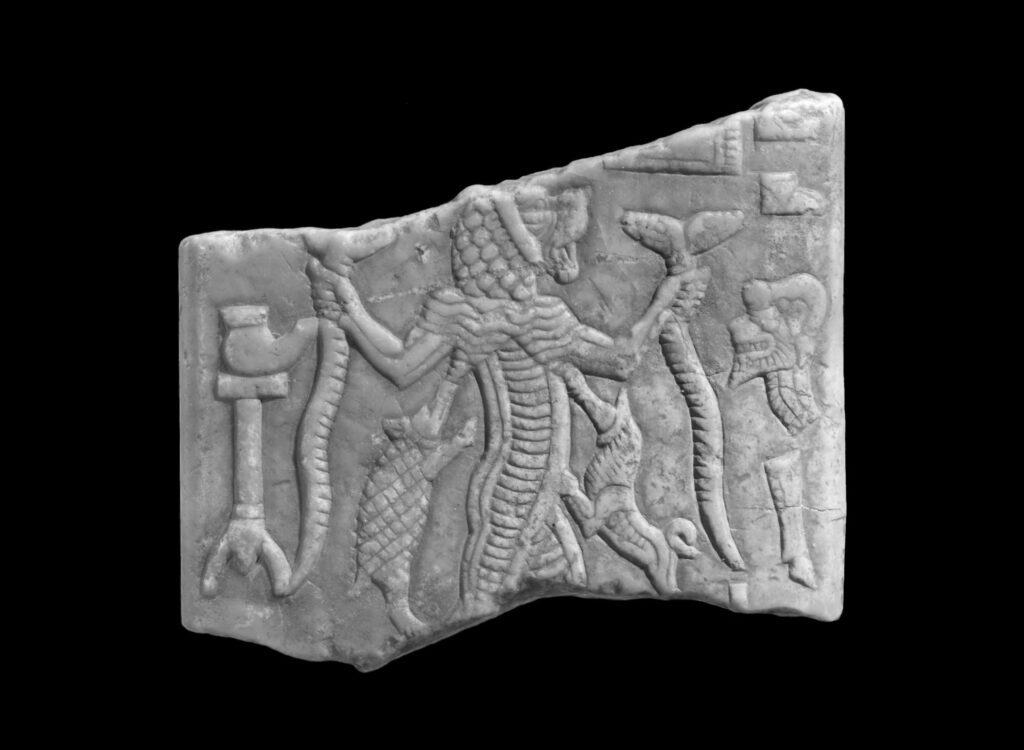Emily Urquhart has chosen an appropriate title for her third book, which successfully blends the analytic rigour of the essay with the structures and motifs of various “wonder tales”— a term she prefers to either “folklore” or “fairy tale.” The author’s academic and journalistic training, her eye for the strange and marvellous, and her expertise in European fables all come together in this curious gathering of stories borrowed from everyday life. While Ordinary Wonder Tales is replete with autobiographical fragments, the tone is restrained: self-analysis never courts self-indulgence, and personal experiences merge seamlessly into the yarns we spin and the beliefs we pass down.
The book’s third essay, “Chimera,” opens like an anthropological study. In Mesopotamia, we read, pregnant women kept amulets in the shape of Lamashtu, a “feathery, lion-headed demon” whose name means “she who erases.” At the malevolent goddess’s whim, a fetus, an infant, even a mother might vanish from the earth. Similarly, in Romania it was once common to wear a tiny book suspended from a chain around the neck; the words inside were thought to ward off Samca, “the beast who devours the unborn.” Urquhart describes these customs with the sobriety one would expect from a folklorist, but the paragraph takes a turn when she confesses: “And me? I had no prayer, spell, or incantation. Instead, I wrote down a diagnosis I was hoping against.” The words “ectopic pregnancy” were intended to alert first responders should she collapse from internal bleeding, but they became a “charm against encroaching threat.” Even medical science makes use of myth: the chimera of the essay’s title refers to both the fire-breathing hybrid beast and the fetal cells that remain in a woman’s body after birth or pregnancy loss.
Most of the ten chapters involve parents, children, and siblings, but a few move beyond the family sphere into explicit social commentary. “Lessons for Female Success” blends contemporary accounts of violence against women with cautionary tales from Francis James Child’s anthology of English and Scottish ballads. “If you don’t pay attention,” Urquhart notes of the notoriously dark genre, “you’ll miss what it’s telling you.” Even seductive poetic phrasing —“He takes her by her lily white hand” and the like — can signal impending violence.
That particular line could have been pulled straight from Urquhart’s own experience. As a young journalist in Kyiv, she was mugged just outside her apartment one night by two men. One of them, she writes, took her hand “in a strong and painful grip.” When she attempted to pull away, her white mitten slipped off. Then she was thrown “to the ground with a full-body slam.” Her tailbone crashed against the pavement; her skull followed.

The malevolent Lamashtu, holding snakes and suckling a pig and a dog.
Amulet with a Lamashtu demon, seventh to sixth century BCE; The Met, New York
After the assault, the mitten was recovered. “Reunited,” Urquhart observes with irony, “they were a lily-white pair once more.” She discarded them, but the attackers never really left. “They appear when I rise too quickly from a hard-seated chair, sending a shot of pain up my back,” and during pregnancy they accompanied her “step by step” as her “injured tailbone creaked under” the “heft and sway” of her body.
“Nuclear Folklore,” another example of social criticism, considers recent history and its literal radioactive traces. Urquhart does not draw explicit connections to specific tales here, but readers are sure to recognize the signs of a haunting. The setting is a house at 150 Dorset Street in Port Hope, Ontario. In 2016, Urquhart visited the owners to ask “about the site’s nuclear heritage.” What she learned is truly disturbing.
In the 1970s, dangerous levels of radon gas were detected in a local elementary school, prompting what would become the country’s largest nuclear cleanup. Over seven years, about “200,000 tonnes of contaminated earth and homes were removed,” including a “ramshackle, red-brick, Victorian beauty” on Dorset Street. After remediation, a local contractor bought the property and moved an old carriage house onto the lot, which he had dug out for a basement. Low on funds, the contractor sold the home in 1981 to an elderly woman, who decided to have the unfinished basement filled.
Decades later, Ottawa introduced a new environmental cleanup program. As part of the Port Hope Area Initiative, local homes were once again inspected for radiation. The interior of the carriage house contained 1,200 becquerels per cubic metre of radon air — twelve times the level considered acceptable by the World Health Organization. Further investigation revealed that the basement had been filled with slag from the old Eldorado Nuclear plant — just a few years after remediation.
“Nuclear Folklore” is the most essayistic piece in the collection, and for that reason it is all the more striking in its relation to the wonder tale: it’s not just that the blue-green sparks of radon can be “strangely beautiful” or that nuclear power can seem magical or that a house can be haunted by radiation. Urquhart gets at something more unsettling when she notes the discrepancy between official accounts and reality. In government documents, “the contamination of Port Hope is referred to as an historical event.” This is wrong, however. “With nuclear waste, there is no such conclusiveness to be had.”
Whether as waste or microchimeric cells or injuries that never fully heal, the traces of our actions and experiences persist. But, Urquhart ultimately shows us, how we talk (and write) about them is up to us.
Marlo Alexandra Burks is the author of Aesthetic Dilemmas and a former editor with the magazine.

